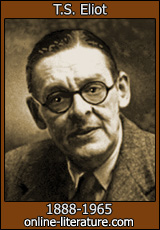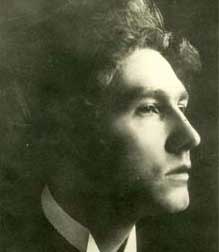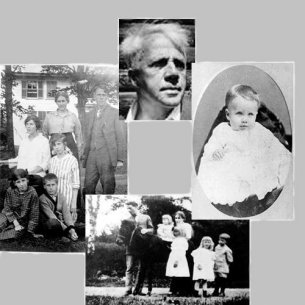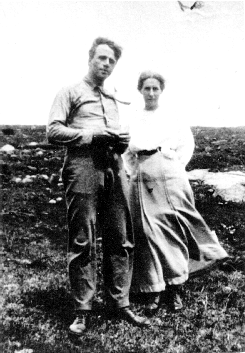Frost in Love
Fall of Frost, Brian Hall, 2008
A work of biological fiction where the author, choosing a few incidents and events of a very long life (89 years), imagines what Frost might have been thinking and how events may have shaped his words. Done with love and humor, but without the cooperation of the Frost estate, this novel brings us to understand and care about Frost as his several biographers have failed to do. Written as a series of vignettes randomly organized from the 1890s to 1963, we slowly are introduced to Frost, his wife Elinor, a high school friend who jilted Rob at one time, and their long suffering children.
Frost bought several New England farms but was a lazy, untalented farmer and Elinor a very casual housekeeper and mother. Both were spacey in the extreme. Frost quips that New England farmers have been failing for three hundred years so he is in a good tradition. They lost one child at age 3 and another after 3 days. Elinor aborted their final pregnancy over fears for her health. Of their surviving children, Margorie died at age 29, crazy Irma was finally committed by Frost but lived to 78, and suicidal son Carol (Why did you give me a girl’s name?) finally shot himself at age 38 within hearing distance of his own 15 year old son. Tough daughter Leslie, after her divorce, jointed the United States Information Agency (USIA) where she spent a career telling everyone in sight that the agency was doing everything wrong.
Frost with Kay and Theodore Morrison 1948 
After the death of Elinor in 1940, Frost established a close relationship with a married woman that would last until Frost’s death. Frost claimed K was his lover but K never divorced and maintained the relationship was all in Frost’s mind, she was simply his secretary. At JFK’s inauguration, Frost was invited to read a poem. He was stumbling badly and couldn’t read his papers in the bright sun. LBJ tried to use his hat to shade the papers but Frost grabbed the hat and they wrestled for a bit. At the conclusion of the reading he misremembered the President’s name.
In 1962 Frost meets Soviet ambassador Anatoli Drobinin in whom he confides he is a great admirer of self made Khrushchev but is concerned with the tensions over Berlin and has some suggestions. Drobinin arranges a meeting with Khrushchev and 88 year old Frost flies off to Moscow (he hates flying). Frost becomes feverish and Khrushchev goes to Frost’s hotel. Frost tells Khrushchev he is the most powerful man in the world and that Frost really admired the moon shot and orbiting astronaut. Frost tells Khrushchev that the powerful should also be magnanimous and he should give East Berlin back to the West Germans as a sign of that magnanimity. Khrushchev doesn’t take the advise. When word drifts back to Washington JFK is furious. Frost returns home at the height of the Cuban missile crisis. He imagines the nuclear destruction of all mankind and it inspires new poems.
Frost spent year after year, at the end, giving farewell tours. These tours were so popular, that after his death a show with two actors playing the young and old white haired Frost was mounted to continue the farewell tradition. Ever the showman, Frost died on Ground Hog’s day 1963. Daughter Leslie and K secretly interred Frost’s ashes in an unmarked grave in the family plot. Leslie will lord it over Frost’s estate the rest of her life. Few of Frost’s letters show up after he dies, having been destroyed or lost by most of his children and K. Hall suggests, wickedly, that Irma probably ate hers.
Frost universally hated all critics and professors who “interpret” his work for their students. The only one he trusted as a critic was Elinor. He never liked the poetry of Tom (T.S.) Eliot and hated his army of thousands of (Wasteland) interpretive Professors. He was somewhat fonder of Ezra Pound and even assisted in getting Pound released from his asylum.
Hall himself is no slouch when it comes to words. Example of imagined thoughts of Frost:
Freud was a frustrated Novelist. His system is a form of Swedenborgianism, taking good metaphors and petrifying them into dogma.
Self reflections of Frost on his fame:
He’s been given jobs without duties, students without classes. Money has come mysteriously, from a secret fund, an anonymous admirer, a colluding collector. When he has hinted after prizes, committees have gone down on one knee to hand them to him. He, who played sick from school most of his childhood and never finished college, has been awarded so many honorary degrees he had the hoods sewn into a quilt, and at night he sleeps under it like a Celtic Pendragon warmed by the skins of his enemies. Each time he has hinted, connived, covered his tracks, hinted again, he’s got what he wanted, and each time he has felt guilty, and vindicated, and mean, and undeserving, and long overdue.
Frost proves a talented teacher, but a late bloomer in fame with his poetry. When recognition starts to come:
They want to press him while he’s impressive, screw him down in the frame. Principal of some stone institution, state commissioner for pickling souls. They’ll kill him with the best intentions. Run!
On longevity:
..Cannily wicked Dylan Thomas has succeeded in drinking himself to death…His soul and his stock rise, hand in hand. Frost’s own vanity, fiercely held is this, he will survive. The steeple is not for directing eyes heavenward, it’s for climbing, and Frost will remain at the top–partly by kicking, when he has to, other climbers in the face, but mainly, (so simple!), by not leaping off.
On his poem November:
What makes New England rich is its decay, its compost. Waste turned under. The waste of laziness! Which his grandfather deplored. But Rob’s laziness rotted and sprouted his poems. The practical crowd want to ignore the waste leisure and of pleasure, and the pacifist crowd want to ignore the greater waste of human hate, which maybe can be as lordly and creative as hate.
T.S. Eliot  Ezra Pound
Ezra Pound 
On a conversation with the Younger Poet after his death:
This is hell. If you want change, go to purgatory. Tom and Ezra are there, vomiting up their undigested Latin. They’ll be ready for heaven in about a thousand years…I was great wasn’t I? It takes a moment for the Younger Poet to recognize this as a question. “Yes.” You hesitated.


